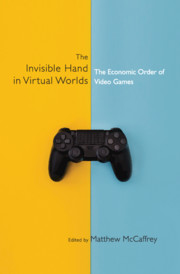Book contents
- Frontmatter
- Contents
- Introduction
- 1 The Economic Meaning of Play: Ludology and Praxeology in Video Game Worlds
- 2 Spontaneous Order and Video Game Narrative
- 3 Law and Economics in a World of Dragons
- 4 Minerals, Titans, and Connections: The Political Economy of Empire in the World of EVE Online
- 5 The Origins of Money in Diablo II
- 6 A Virtual Weimar: Hyperinflation in Diablo III
- 7 The Facilitate or Acquire Decision: The Tipping Points for Strategies toward User-Generated Content in Massively Multiplayer Online Game Platforms
- 8 Mod the World: How Entrepreneurs Learn from Video Game “Modding” Communities
- 9 Levels without Bosses? Entrepreneurship and Valve's Organizational Design
- About the Contributors
- Index
7 - The Facilitate or Acquire Decision: The Tipping Points for Strategies toward User-Generated Content in Massively Multiplayer Online Game Platforms
Published online by Cambridge University Press: 31 July 2021
- Frontmatter
- Contents
- Introduction
- 1 The Economic Meaning of Play: Ludology and Praxeology in Video Game Worlds
- 2 Spontaneous Order and Video Game Narrative
- 3 Law and Economics in a World of Dragons
- 4 Minerals, Titans, and Connections: The Political Economy of Empire in the World of EVE Online
- 5 The Origins of Money in Diablo II
- 6 A Virtual Weimar: Hyperinflation in Diablo III
- 7 The Facilitate or Acquire Decision: The Tipping Points for Strategies toward User-Generated Content in Massively Multiplayer Online Game Platforms
- 8 Mod the World: How Entrepreneurs Learn from Video Game “Modding” Communities
- 9 Levels without Bosses? Entrepreneurship and Valve's Organizational Design
- About the Contributors
- Index
Summary
INTRODUCTION
This chapter turns the reader away from the discussion of video game monetary economics to a broader issue: video game business strategy for MMO game companies. Instead of asking how video game economies work, here we look at how video game companies manipulate both their internal capabilities and their external industrial environment to increase their competitive performance. At the end of the day, a video game company is usually a for-profit firm like any other, looking to increase its financial performance through business strategy (Gidhagen, Ridell, and Sörhammar, 2011).
Scholars have not closely examined the best competitive strategies that platform-based firms use to cope with competitive pressures from user-generated content (Bogers and West, 2012). Sometimes user-generated content increases revenues by increasing overall platform usage, but other times it can decrease revenues by cannibalizing the core product offerings. This chapter uses transaction costs theory and the literature on the informal economy (Godfrey, 2011; Chen, 2005) to analyze MMO firm strategy. Three MMO mini-case studies on Rage of Bahamut, Minecraft, and Dota 2 address why MMOs face a “facilitate or acquire” decision for management of user-generated content.
Gray markets are a fascinating, and yet under-theorized, phenomenon (McGahan, 2012). Often confused with black markets, gray markets are places where humans conduct “socially legitimate” economic transactions but with little regard to existing formal (legal) business institutions (Webb et al., 2009; Chen, 2012; Maloney, 2004). Black markets deal directly in goods and services deemed socially irredeemable, whereas gray market actors’ productive and exchange activities contribute positively to welfare. Each gray firm, no matter whether an individual, an ad hoc group project, or an organization, chooses grayness to achieve some goal while also avoiding costly institutional obligations and legal formalities required of white firms.
Gray firms may thrive if the costs of institutional formalization exceed the benefits. Gray transaction types are diverse, including conducting “handshake” informal agreements, impromptu bartering, using peer production in “common” spaces (Benkler, 2002), the used product aftermarket, and parallel markets—a business model that cheaply resells legal goods through informal trade networks to bypass official marketing channels, arbitraging local price differences (Lindauer, 1989). The most common gray firm in the world is probably an “under the table” service worker in the household-to-household economy, such as teenagers who do small amounts of yard work and childcare (Chen, 2005).
- Type
- Chapter
- Information
- The Invisible Hand in Virtual WorldsThe Economic Order of Video Games, pp. 152 - 182Publisher: Cambridge University PressPrint publication year: 2021



